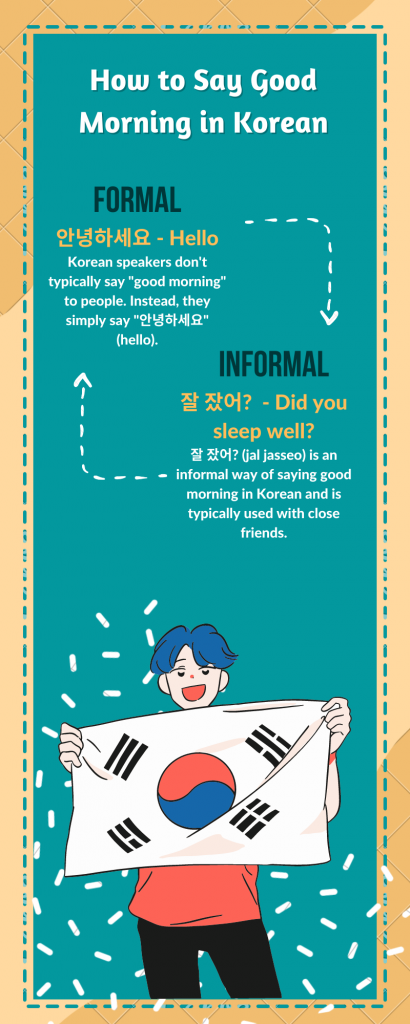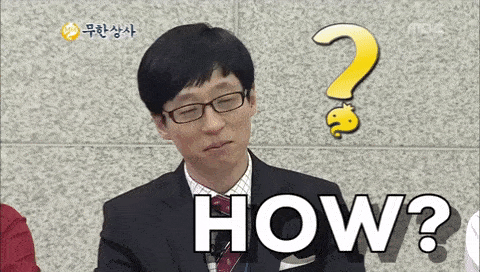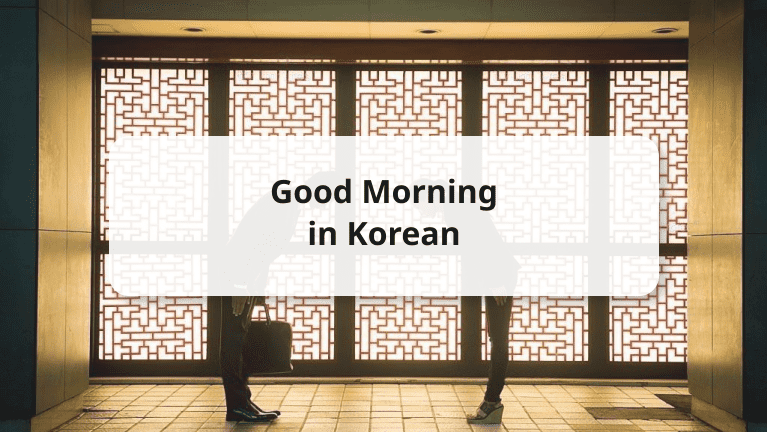Learning how to say good morning in Korean is an integral part of Korean culture and etiquette, especially in South Korea. It is an effortless way to greet that is easy to do, nice, polite, friendly and always a good way to start the day on a positive note.
As much as it’s imperative to learn how to say good morning in Korean It is just as important to know which greetings are appropriate depending on the setting and the people involved.
If you are concerned that Korean is one of the hardest languages to learn, you should change your mindset. It is far easier to look at the Korean language as a sum of its parts as opposed to one entity.
In this article, we will be learning how to say good morning in Korean both formally and informally and how to use these phrases appropriately. If this is your first time joining us, check out our article on Korean girl names, it’s a brilliant way to practice vocabulary and phonetics.
Good Morning in Korean: Formal and Standard

좋은 아침이에요(joeun achimieyo) – Good morning
When learning Korean you’ll notice that some of the cultural elements are built into the language. That means that some of the phrases won’t translate directly. So when relating back to this greeting, this phrase is probably the closest equivalent to the English “Good morning.” However, it’s not used as often as you’d expect as it’s not as common as saying “good morning” in English. you can certainly still put it to good use as a nice and rather joyful-sounding formal greeting or as a more literal comment on the actual status of the day, like the weather for example.
잘 주무셨어요? (jal jumusyeosseoyo) – Did you sleep well?
This is a formal and polite way of saying good morning in Korean. We’ve established that the Korean language is built heavily around culture so this formal phrase should be used when referring to people that are elders, parents, and someone older than you. This concept is known as **Korean honorifics**. These are special titles, words, and verbs that are used to refer to people older than you or higher than you in the social hierarchy. This phrase is a question that directly translates to “did you sleep well?” if somebody uses this phrase towards you the appropriate way to reply would use the lower form of the verb. In this case saying, you could reply with “네, 잘 잤어요” (ne, jal jasseoyo), meaning “yes, I slept well.”
안녕히 주무셨어요? (annyeonghi jumusyeosseoyo) – Did you sleep peacefully?
This is another formal and common way to say good morning in Korean. To be directly translated this phrase means “did you sleep peacefully?” it is the equivalent of asking “how was your sleep?” in English. The time in Korean language and culture is important, this phrase should only be used when you first meet somebody after they wake up instead of a general greeting before lunch time which is common in the English language. This phrase is more formal than the one above which has to do with the verb conjugation. This means that the verb in this phrase 주무시다 (ju-mu-shi-da, “to sleep”) is a more formal version of the verb 자다 (ja-da, “to sleep”).
안녕하세요 (ahnnyunghaseyo) – Hello (formal)
This greeting is considered the most common way to say good morning in Korean. It’s even more frequently used than most morning-specific greetings! What makes this greeting more formal is its inclusion of an honorific word, which makes it more respectful in nature when added to the end of a phrase or sentence. But you already knew that. You should use this phrase when greeting your elders, those with whom you’re less familiar, your social and professional superiors and other folks that deserve a degree of respect.
Good Morning in Korean: Informal

좋은 아침 (joeun achim) – Good Morning
If you run into a friend in the early hours and need a casual way to greet your buddies you can use 좋은 아침. This is a less formal version of 좋은 아침이에요. However it is used less frequently compared to the former. If you plug it into a translator it literally means good morning in Korean. According to the Korean alphabet, 좋은 (joeun) means “good” and 아침 (achim) means “morning.” It can be considered the equivalent to the simple English greeting of “Morning” and can also work to comment on the morning itself. It is important to remember that this greeting is not suitable for any formal or professional setting.
잘 잤어? (jal jasseo) – Did you sleep well?
Like its formal counterpart, by removing the honorific ending 요, you get an informal equivalent. This phrase translates to the question, “did you sleep well?” This greeting should only be directed at people who you would consider to be your friends or those that are close to you. The rule of thumb is that if you don’t have to be formal or overly respectful when greeting someone then it would be appropriate to use this greeting.
굿모닝 (guunmoneeng) – Good morning (slang)
If you’d like to fit in with Korean online spaces or text messages, this greeting is a good one to know. In this phrase, none of the words actually have a standard Korean meaning! Rather a Konglish (Korean-English) greeting. This means that it’s quite literally a Korean phonetic spelling of the English “Good morning.” it’s highly considered to be slang, this means that you probably shouldn’t use this greeting in real-life with someone and definitely not to anyone who deserves a bit more respect. If you’re texting close friends (especially online), a romantic interest or even a younger sibling then this phrase would be deemed appropriate.
안녕 (ahn-nyung) – Hello (informal)
If you yawn more than you talk in the morning then this short and quick informal phrase is right up your alley. We’ve discussed the formal version of this greeting, which is 안녕하세요, the informal version is created just by removing 하세요, which makes it vastly more casual. If you’ve heard this phrase being thrown around by peers, that is because it is a very commonly-used greeting among friends and when addressing those who are close to or younger than you in age. It also conveniently serves as a dual-purpose word, 안녕 can also be used to mean “Goodbye.”

FAQs

In most situations when speaking Korean You can use “hello” instead of saying “good morning.” this would be 안녕 (Hello – informal) or 안녕 (Hello – informal). 잘 잤어? (jal jasseo) is also a very common way to say good morning in Korean and translates to “did you sleep well?” it is not necessarily formal but it is a standard way of greeting.
In Korean culture it is common and polite practice to slightly bow your head when greeting others. Learning how to greet etiquette and with proper manners is emphasised from a young age. It is common to see children greet their teachers with a “Good morning” greeting while folding their hands near their navels and bowing their heads. These days, many Koreans usually shake hands when greeting.
Use Good Morning in Korean to Start Your Korean Journey
Wishing someone a good morning is a polite staple to everyday life. You are now able to perform proper etiquette in the AM which goes a long way in first impressions, especially in Korean culture.
To recap, 잘 주무셨어요? (jal jumusyeosseoyo) which means “did you sleep well?” is the appropriate greeting in a formal setting. 잘 잤어? (jal jasseo) which also means “did you sleep well?” is the informal response aimed at close friends. 안녕하세요 (ahnnyunghaseyo) is the standard way of saying good morning in Korean and simply means “hello”.
If you’ve enjoyed learning these greetings, try your hand at learning good morning in Chinese. Once you’ve nailed that, move on to practicing how to say good morning in Japanese.
You’ve taken big steps in learning the Korean language but if you’re ready to make strides then finding a professional tutor to guide you further will take what seems like a monumental endeavor into an accessible learning experience.
Finding an online tutor has never been easier, but if you’re still not sure where to start, over 2 million students have found success finding personalized professional tutors with AmazingTalker, and they have your perfect tutor ready for you.

















